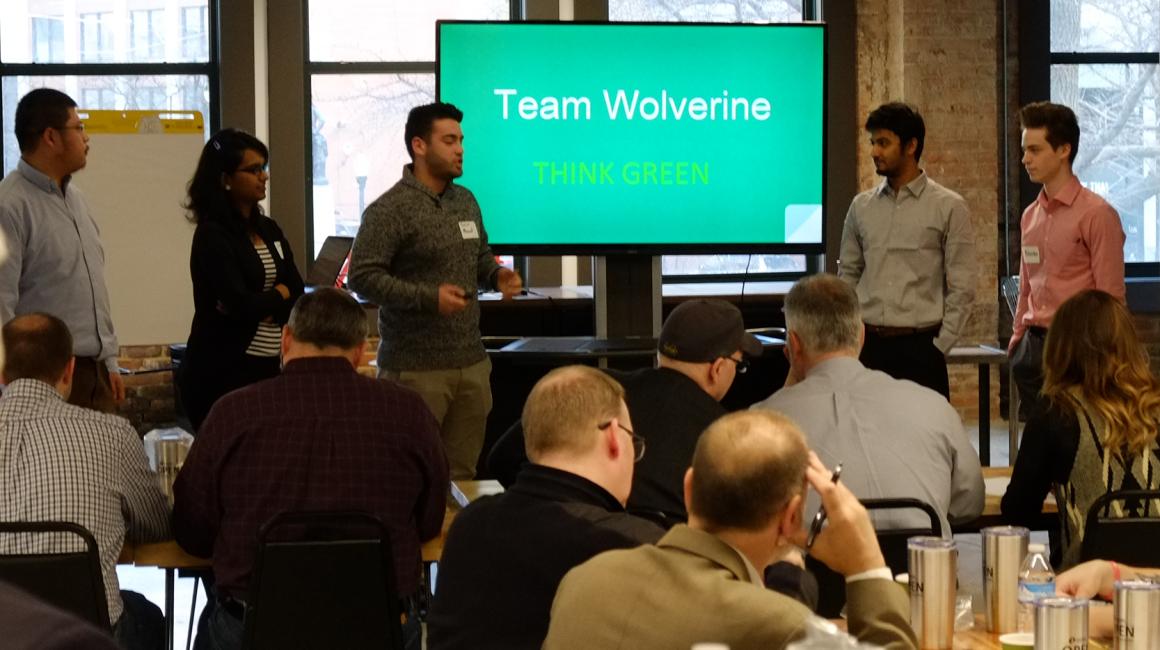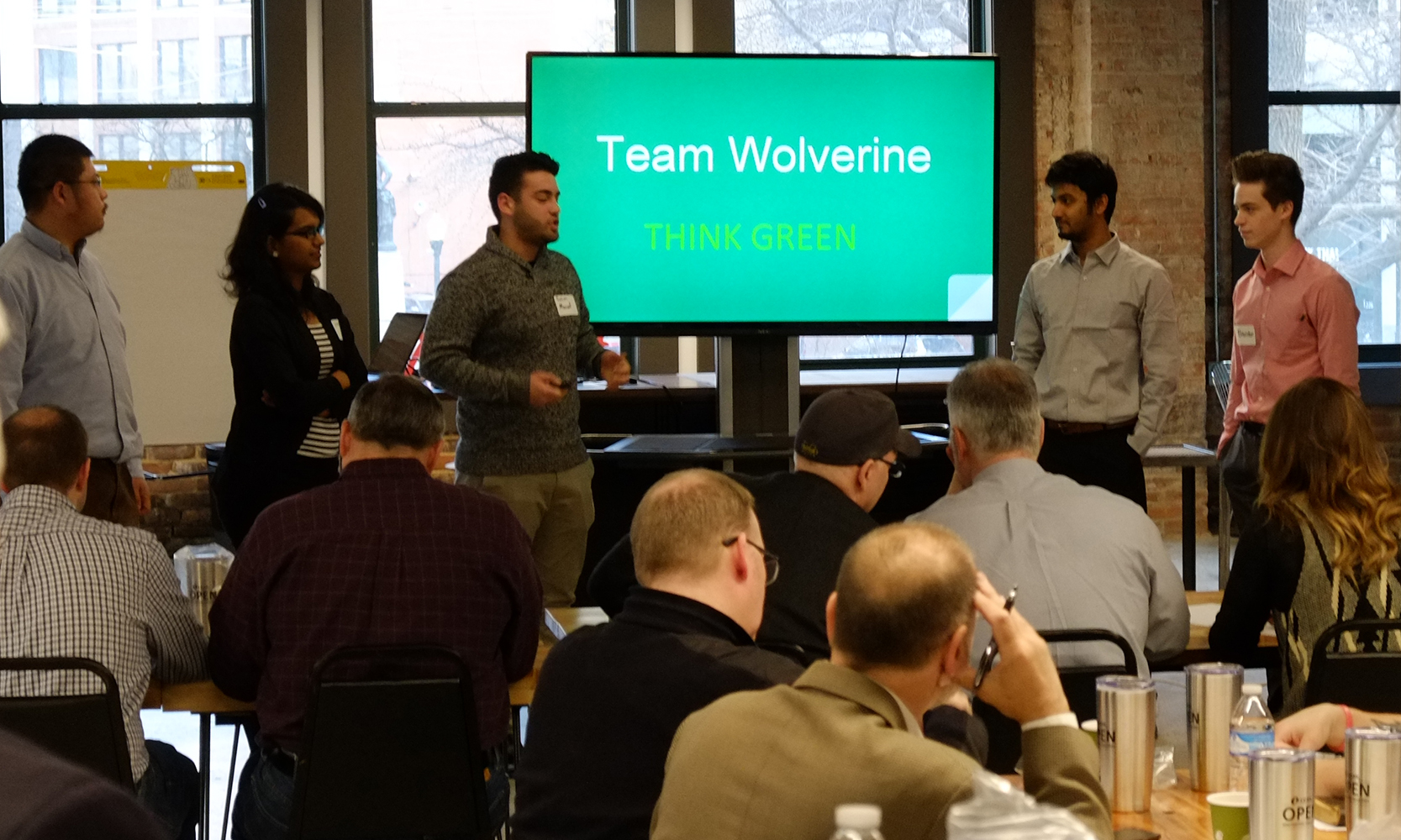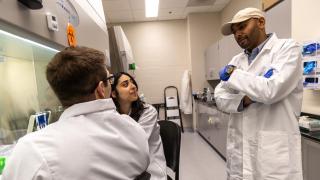
Brandon Dix usually works retail, golf caddies or does construction during the summer.
But not in 2017.
Dix, a freshman studying mechanical engineering, won an internship at Lear Corp.—a leading global supplier of automotive seating systems and electrical systems— through the Lear Open Innovation Challenge. He, along with his four team members, placed first and received a paid Lear internship during the spring competition created for U-M Ann Arbor, Wayne State and UM-Dearborn students.
“When I heard about this challenge, I immediately applied,” said Dix, his team’s leader and the only freshman in the competition. “The sooner I get work experience in the field, the more I’ll know what I want to do. I want to be inspired early on.”
The Lear Open Innovation Challenge culminated on April 1 in a tournament-style competition made up of interdisciplinary teams of engineers and business entrepreneurs. The teams’ goal? To come up with the most creative cost and time effective solution to a Lear manufacturing process.
Students then pitched their ideas to Lear executives, venture capitalists, executives from other industries, and faculty members at the Lear Innovation Center in downtown Detroit. After the 15-minute pitch, there was a 10-minute question and answer session per group.
Out of the 28 final competitors, half were from UM-Dearborn.
“UM-Dearborn had the most representation at the challenge,” said UM-Dearborn Vice Chancellor for Business Affairs Jeff Evans, who promoted involvement on UM-Dearborn’s campus. “Many of our students are from here and stay here after graduation. Internships, especially one like this, are powerful. It plugs them into essential networks, gives them marketable real world experience and shows potential employers how fantastic our students are.”
Evans said UM-Dearborn was approached to take part in this workshop and pitch because of its commitment to metropolitan impact, connection to the automotive industry and caliber of students.
The business and engineering-focused challenge gave everyone, not just the winning team, something to take with them. Other prizes also were given out—like Shinola watches, custom Haworth office chairs, and cash awards—and there were additional accolades for outstanding individuals and inventive plans. But students said the most valuable part of the experience was the networking connections and lessons on innovative thinking.
Prior to the public pitch, students spent a weekend learning about innovative thinking using a method created by Jeff DeGraff, Ross School of Business clinical professor and Ann Arbor-based Innovatrium founder.
Angelo Policicchio, a sophomore studying finance and accounting, said DeGraff’s approach to teamwork and innovation was something new to him—but he’ll take it with him on his future career path. He said his teammates were not only diverse in educational background, but in many other ways too—and that made for more inventive and well-thought-out ideas.
“Before we came up with one short term and one long term solution, we had 500 ideas. I am not kidding,” said Policicchio, whose team was honored with a cash prize for the best business plan. “All five of us came from five different countries and had five different native languages. We had different approaches to the problem and that helped us come up with a variety of ideas and two solid solutions.”
Data science junior Fatemeh Makki said working in a team was the most challenging and rewarding part of the competition.
“This was a lot of hard work, especially with preparing for the presentation and coordinating everyone’s schedules with work and school. There was a lot of Skyping—almost two hours every night. But having this shared experience brought us together,” said Makki, who won a individual cash prize for her portion of the group work. “I learned so much about myself through my team and we’ve all become friends after the challenge, which has increased the size of all of our networks.”
Staney DeGraff, Innovatrium CEO, said the goal of the event was to connect a business focused on Detroit’s resurgence with talented local students. She said that type of engagement is what will continue to energize the Motor City.
“Detroit is going through a Renaissance period now. And one of the biggest and most important things that we can do is develop the ecosystem for innovative thinking. We have a homegrown talent pool, especially with universities so close,” DeGraff said. “But, in Michigan, 600,000 engineering jobs remain unfilled. We want to show students what is happening in Detroit. We want them to stay and continue to move Detroit forward.”
Dix said he is excited to be a part of the solution and to have landed a paid internship at a large Fortune 500 company right after his freshman year.
“I have several friends and family members in the auto industry, so I know what a big deal it is to get this internship at Lear. This competition has shown me a whole new way to solve problems. And I know that there is much more that I’m going to learn over the summer.”





